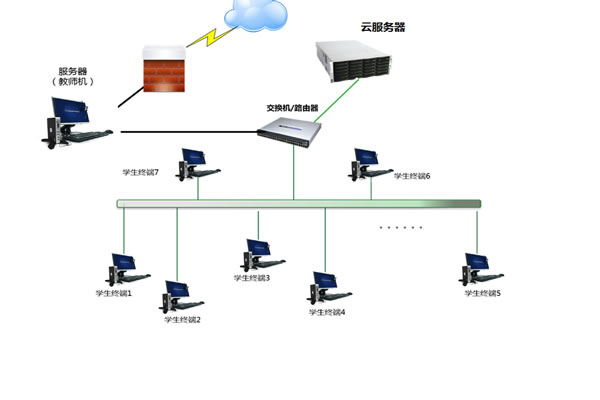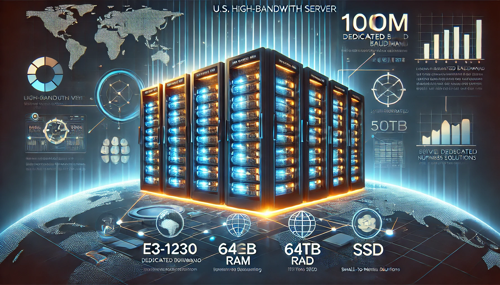
in the digital age, the rapid development of cloud computing technology has made cloud servers an important choice for enterprises and individual users. as a leader in cloud computing, the united states provides a variety of cloud servers to meet the needs of different users. this article will analyze the characteristics, advantages and disadvantages of these cloud products in detail to help you make smarter choices.
1. public cloud server
public cloud servers are resources provided by cloud service providers to multiple users over the internet. this type of server is often highly scalable and cost-effective, suitable for smes and startups. users only have to pay for the resources they use, without additional infrastructure maintenance costs.
the advantage of public cloud lies in its strong resource sharing capabilities and flexibility. users can quickly increase or decrease resources according to demand to ensure business flexibility. however, public cloud security is relatively low, as multiple users share the same infrastructure, the risk of data breaches may increase.
2. private cloud server
private cloud servers are designed for a single user or organization, and all resources are exclusive to that user. enterprises can deploy private clouds in their own data centers, or choose private cloud services provided by third-party service providers. this type of server provides higher security and control, suitable for industries with high data security requirements, such as finance and medical care.
while the initial investment in private clouds is relatively high, its flexibility and security make many large enterprises willing to choose this solution. users can customize according to their own needs to ensure the high performance and stability of the system.
3. hybrid cloud server
hybrid cloud servers combine the advantages of public and private clouds, allowing users to flexibly switch between the two. enterprises can store sensitive data in a private cloud while leveraging the computing power of the public cloud to process non-sensitive data. this model not only improves resource utilization, but also enhances data security.
the flexibility of hybrid cloud allows enterprises to allocate resources according to actual business needs and support diversified application scenarios. however, the complexity of managing a hybrid cloud environment is also relatively high, requiring professional teams to maintain and monitor.
4. community cloud server
community cloud servers are private clouds shared by multiple organizations, usually built and maintained by enterprises with similar needs and compliance requirements. this type of cloud server is suitable for companies in a specific industry, such as government agencies and educational institutions, to share resources and costs together.
the advantages of community cloud lies in cost sharing and resource sharing, while maintaining high security and compliance. through cooperation, participating organizations can enjoy more efficient cloud services. however, this model may lead to management complexity due to the different needs of the participants.
5. functional cloud server
functional cloud servers focus on specific application scenarios, such as cloud storage, cloud database and cloud computing. such servers usually provide optimizations for specific functions and are suitable for users who require high-performance computing or big data processing. for example, cloud database services can provide enterprises with efficient data storage and management solutions.
the advantage of functional cloud servers is their targetedness and efficiency, and can meet specific business needs. however, due to its specificity, users need to ensure that the functions match their own needs when making choices to avoid wasting resources.
6. edge cloud server
edge cloud servers are cloud computing resources deployed at the edge of the network, designed to increase data processing speed and reduce latency. this type of cloud server is particularly suitable for applications that require real-time data processing, such as the internet of things (iot) and real-time video streaming. the advent of edge computing enables data to be processed locally faster, rather than sending all data back to the central cloud.
the advantage of edge cloud is that it improves user experience and system response speed. with the development of iot and 5g technologies, the application of edge cloud will become more and more extensive. however, the deployment and maintenance of edge clouds are relatively complex and require professional technical support.
7. cloud hosting server
a cloud hosting server is a service that hosts websites and applications in a cloud environment, and users do not need to manage physical servers themselves. cloud hosting usually provides functions such as automatic backup, load balancing and security protection, which are suitable for small and medium-sized enterprises and individual users.
the main advantage of cloud hosting is that it simplifies the management process and allows users to focus on business development. through cloud hosting, enterprises can gain greater reliability and flexibility, but they need to pay attention to their service quality and support capabilities when choosing a service provider.
summary and suggestions
to sum up, there are many types of cloud servers in the united states , each with its own characteristics. users should evaluate them according to their own needs when choosing. public cloud is suitable for startups with limited budgets, private cloud is suitable for enterprises with high security requirements, hybrid cloud provides business flexibility, and community cloud is suitable for organizations in specific industries. functional cloud and edge cloud are designed for specific application scenarios, improving performance and efficiency.
when choosing a cloud server, it is recommended that enterprises and users fully analyze their business needs, budgets and security requirements to ensure that they choose the most suitable cloud product to achieve the best return on investment and business development.
- Latest articles
- Explore The Market Prospects Of Taiwan’s Vps Cn2 High-defense Space
- Korean Native Ip Server Rental Process And Selection Tips
- Cost-effectiveness Analysis Of Singapore Vps Unlimited Traffic Service
- Explore The Speed And Stability Of Malaysia’s Cn2 Servers
- Cloud Server Selection Guide In Malaysia To Help You Make Informed Decisions
- Key Factors And Suggestions For Choosing A Singapore Server
- The Real Experience Of Visiting The Alibaba Cloud Server Base In Singapore
- Advantages And Selection Guide Of Renting A Server In South Korea And The United States
- How To Build An Efficient Vps Service In Hong Kong
- Practical Tips And Suggestions For Cn2 Network Optimization In Cambodia
- Popular tags
-
Complete Steps To Build Vpn Using Alibaba Cloud Us Servers
this article details the complete steps for setting up a vpn using alibaba cloud's us servers to help users achieve secure network connections. -
Configuration And Price Analysis Of Us Cloud Server Vps
in-depth analysis of the configuration and price of us cloud server vps to help users choose the most suitable cloud server solution. -
How American Broadband Vps Can Improve Your Online Business Performance
this article explores how to improve your online business performance through american broadband vps and provides professional advice and optimization strategies.


